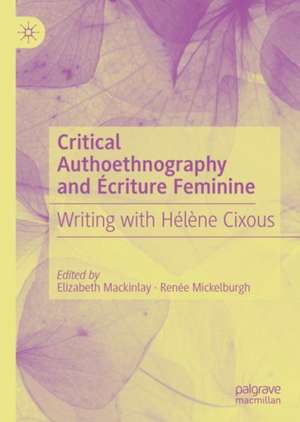Critical Autoethnography and Écriture Feminine: Writing with Hélène Cixous
Editat de Elizabeth Mackinlay, Renée Mickelburghen Limba Engleză Hardback – 13 oct 2023
Preț: 713.70 lei
Preț vechi: 870.36 lei
-18% Nou
Puncte Express: 1071
Preț estimativ în valută:
136.63€ • 140.52$ • 113.35£
136.63€ • 140.52$ • 113.35£
Carte tipărită la comandă
Livrare economică 17 februarie-03 martie
Preluare comenzi: 021 569.72.76
Specificații
ISBN-13: 9783031400506
ISBN-10: 303140050X
Pagini: 179
Ilustrații: XXI, 179 p. 13 illus.
Dimensiuni: 148 x 210 x 19 mm
Greutate: 0.4 kg
Ediția:1st ed. 2024
Editura: Springer Nature Switzerland
Colecția Palgrave Macmillan
Locul publicării:Cham, Switzerland
ISBN-10: 303140050X
Pagini: 179
Ilustrații: XXI, 179 p. 13 illus.
Dimensiuni: 148 x 210 x 19 mm
Greutate: 0.4 kg
Ediția:1st ed. 2024
Editura: Springer Nature Switzerland
Colecția Palgrave Macmillan
Locul publicării:Cham, Switzerland
Cuprins
1: Introduction: Digging, Unburying and Going to Writing School.- 2: Writing Myself Back Together.- 3: The School of the Dead and My Mother: A Story of Hunger.- 4: Finding a Language of My Own: Journeying to the School of the Dead with Cixous.- 5: The Narcissist Never Leaves, Only Dies: An Autoethno-graphic Account inspired by Cixous.- 6: Your Dreambody Must be Heard—Writing Trauma in the School of Dreams.- 7: The Fatal Blow: “Who are I?” A Feminist Autoethnographer’s Encounter with Cixous.- 8: This Writing Chatters, Just Like a Dream: The Ragged Vitality of Teeth and Memory Loss.- 9: Learning Cixous’ Écriture Feminine Through the Flow of Words and Blood.- 10: Metis and Cixous—Cunning Resistance, Bodily Intelligence and Allies.- 11: Denying the Penis: Bringing Women to Writing [With/in and] Through Doc-toral Supervision.- 12: Writing Australian Gardens to Cross Borders Between the Online and Offline Worlds.- Inter-View.
Notă biografică
Elizabeth Mackinlay is a Professor in the Faculty of Education at Southern Cross University, Gold Coast (Australia). She has experience in Indigenous education, music ethnography and autoethnography, qualitative research and writing, and feminist issues.
Renée Mickelburgh (PhD) is a feminist communications scholar whose research examines the way Australian women communicate gender justice and environmental issues through digital storytelling. With a background in journalism and communications, Renée has a keen interest in understanding the ways digital storytelling is both a communication tool for gender and environmental justice, and how it creates community, compassion, and connection.
Textul de pe ultima copertă
The project offers a collection of new interdisciplinary critical autoethnographic engagements with Hélène Cixous écriture feminine and work Three steps on the ladder of writing. Critical autoethnography shares a reciprocal, and inter-animating relationship with Hélène Cixous’ écriture feminine (“feminine writing”), and in this collection authors explore that inter-animation by explicitly engaging with Three steps on the ladder of writing. Three steps is a poetic, insightful, and ultimately moving reflection on the writing process and explores three distinct areas essential for writing: The School of the Dead—the notion that something or someone must die in order for good writing to be born; The School of Dreams—the crucial role dreams play in literary inspiration and output; and The School of Roots—the importance of depth in the 'nether realms' in all aspects of writing. Topics covered include: ways Cixous’ work can address the need for loss and reparation in writing critical autoethnography, how Cixous’ writing “makes our body speak” through concepts of birth and the body in, through and of critical autoethnography, whether writing in this way recast and reform prevailing orders of domination and oppression, and how Cixous’ writing around the ethics of loving and giving translates into response-able and non-violent forms of critical autoethnography in relation to otherness and difference. In this collection, we invite you to “Let us go to the school of [critical autoethnographic] writing” (Cixous, 1993, p. 3) with the work of Hélène Cixous, and speak in a different way and through a different medium of academic language, in an approach that reveals the tensions, the paradoxes, the pains and the pleasures of writing with critical autoethnography in the contemporary university.
Caracteristici
Uses Cixous's Three Steps on the Ladder of Writing to theorize and practice autoethnography Harnesses the expertise of feminist scholars across literature, philosophy, gender studies, and anthropology Studies response-able and non-violent forms of critical autoethnography in relation to otherness and difference
